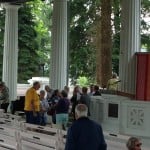God must be replaced with a symbol capable of generating a different and more productive response and organizational pattern to life.
Anthony B. Pinn, The End of God Talk: an African American Humanist Theology
I.
Christian theologian Dietrich Bonhoeffer said, “cheap grace is the preaching of forgiveness without requiring repentance, baptism without church discipline. Communion without confession. Cheap grace is grace without discipleship, grace without the cross, grace without Jesus Christ.”
Now, humanists aren’t about repentance, baptism, communion or any such Christian phraseology. Bonhoeffer has a point for humanists, however. As he watched the Nazis crack down on public meetings and public speech, he was horrified by the passiveness of too many Christians and located the cause of that weakness in easy, inauthentic Christian discipline.
What is cheap grace for humanists? That’s easy: the pat, smug platitudes of liberalism.
How do we avoid cheap grace? One way is to meet in community. A community in which we both explore and practice our values. Humanist values tend to focus on compassion, reason, and justice. A compassionate, reasoning and just community is unlike the society in which we live. Therefore, a humanist community acts counter to societal norms. Educator Paulo Freire outlined a way to make an alternative community effective:
1. To speak a true word is to transform the world.
2. There is no true word that is not at the same time a praxis.
3. There is no transformation without action.
Freire goes on to claim that talk without action is “idle chatter” or “blah,” and that action without reflection is mere activism. “Idle chatter” and “activism” fairly well defines most public discourse, doesn’t it?
Humanist communities don’t want to do that.
II.
One way to accomplish this is through the use of ritual. Historian of religions Jonathan Z. Smith theorizes that ritual is a performance of the way things ought to be rather than how they are. Congregations gather to practice and embody their ideals, thus creating their vision of the ideal community.
As I mentioned, life outside the congregation isn’t compassionate, reasoning, or just. Consequently, humanists gather to remember—and embody—our aspirations.
So, what do rituals actually do? And, what do people do in a ritual? And what happens to people when they do a ritual? After all, humanists are suspicious of ritual and even a hint of manipulation or hocus pocus. After all, ritual has been used for generations as a legitimator of oppression, suppression, and the status quo. Humanist ritual will not enact inequality or exploitation of any kind.
Humanist rituals will necessarily underline the equality of all—hierarchy is not a humanist value. We will rewrite the script by living the values.
III.
Western anthropologists and sociologists long misinterpreted ritual in the case of people not affected by the Western religions of Judaism, Christianity, and Islam. These religions make clear distinctions between the sacred and profane. Many people just don’t see a difference. And humanists positively reject the difference.
That said, in the case of what we can term congregational or group ritual, there is something about location, location, location. Some sorts of rituals are best done in certain spots. The gathering time and place for a congregation, for example. It’s not a holy or sacred place, but it’s a place, and going there is a ritual in and of itself.
What to do once we get there? Humanist ritual in a congregational setting is about finding counter-cultural, alternative truths and acting on them effectively—as a group. Ideally, such an experience will trigger a sense of awe and wonder and open congregants to the creativity of play.
All this in the full knowledge that all philosophies and religions are the product of the fruitful human mind . . . and that all philosophies and religions ultimately fail in the face of reality itself. Finally, all we have is each other.
Truth and action, awe and wonder, all created without the cheap grace of reheated and redirected religious language.
In the congregation I serve, this ritualized community has been taking place every Sunday for a hundred years, never falling for the cheap grace of using “god” or sacred language, but rather reaching for what Dr. Pinn called “a symbol capable of generating a different and more productive response and organizational pattern to life.” Which is us . . .















